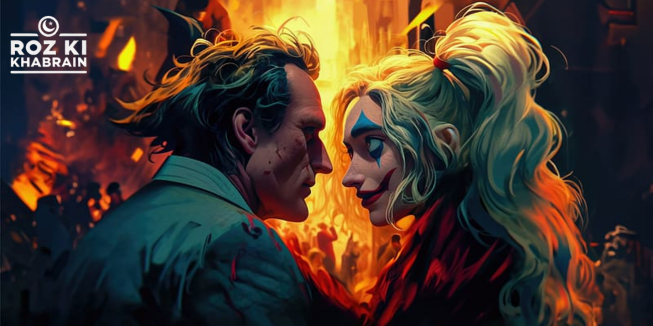The DC film “Joker: Folie à Deux” feels like a sequel searching for significance.
For nearly two and a half hours, director Todd Phillips’ seemingly pointless movie explores various potential justifications for its existence.
However, as “Folie à Deux” becomes increasingly unsettling and bizarre in its quest, it ultimately fails to find a meaningful purpose.
Initially, the film exhaustively attempts to continue the story of Arthur Fleck, the mentally ill aspiring stand-up comedian who infamously killed a late-night talk show host in the previous film.
Joaquin Phoenix, who won an Oscar for portraying this tortured character—a version of Robert De Niro from “The King of Comedy” but with clown makeup—seems to be overexploited for all he’s worth.
The truth is, the eccentric Gothamite, lacking a Batman to challenge him, becomes more odd than compelling.
Arthur’s relentless whispering, glaring, yelling, and repeating his creepy laugh lead to a narrative that leaves viewers feeling detached from him.
With Arthur’s static journey behind bars lacking substance for a sequel, another avenue the film explores is a bizarre concert featuring Phoenix and Lady Gaga.
Gaga plays Harleen “Lee” Quinzel, better known as Harley Quinn—a troubled woman imprisoned in Arkham State Hospital, captivated by Arthur and his rage-driven Joker persona.
Following his killing spree, Arthur has morphed into a cult figure, attracting a legion of disturbed fans like Lee, thanks to a TV movie based on his crimes.
Phillips, seemingly inspired by classic MGM musicals, seizes the opportunity for the duo to perform a Broadway musical’s worth of 15 songs.
This choice evokes the sentiment of the “Miss Saigon” song: “Why, God, Why?”
As they nearly escape Arkham, Gaga performs “If My Friends Could See Me Now” from “Sweet Charity.”
When Arthur learns he will stand trial for his crimes—his lawyer planning to argue a split personality disorder—he sings Stevie Wonder’s “For Once in My Life.”
As Arthur falls for Lee, she sings “Bewitched, Bothered and Bewildered” from “Pal Joey.”
I found myself both bothered and bewildered.
The musical numbers, featuring awkward ballads, duets, and production sequences with ballroom dancing and tap, fail to add any meaningful substance.
These performances, lasting about three minutes each, lack campiness, emotional resonance, or brilliance. They’re not songs I would willingly listen to again.
Ultimately, the reasoning behind “Folie à Deux” hitting theaters is straightforward. The original film, originally intended as a standalone, unexpectedly grossed over $1 billion globally. Thus, we now have a visually extravagant cash grab.
Aside from its undeniably striking visuals—colorful elements bursting through grotesque grime—Phoenix and Gaga deliver strong performances that effortlessly resonate with their roles.
Both actors thrive in portraying deranged characters, and they fit much better in a DC Comics asylum than in the “House of Gucci” or the Palace of Versailles.
However, the material is disappointingly thin, akin to Joaquin’s drastic physical transformation for this role.
Phillips’ plot, primarily set in a courtroom and prison, unfolds as a suspense-free legal drama and a clichéd romance centered around a serial killer.
Lee’s eye-rolling first line to Arthur asks, “What’s a nice guy like you doing in a place like this?”
Arthur’s matter-of-fact response is, “I killed five people—one live on national television,” finally showcasing a comedic timing he previously lacked.
The second half of “Folie à Deux” features the talented Harry Lawtey from “Industry” as Harvey Dent and is filled with courtroom clichés like “Order in the court!” and “I object!”




